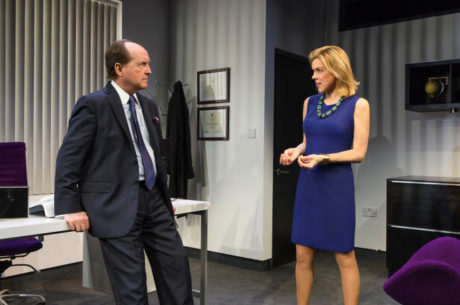I don’t know all the works of author Penelope Skinner, but based on The Village Bike and the currently running New York production of Linda, I suspect she is now on the short list of the best female playwrights working in England. That list would surely include Lucy Prebble (Enron), Nina Raine (Tiger Country), and April De Angelis (Jumpy). We’re not as familiar with them as are the Brits, but Ms. Skinner got off to a good start building a reputation here with The Village Bike which the MCC Theatre produced in 2014. The Manhattan Theatre Club’s Linda has imported its London star Janie Dee to head the current cast of eight players. The setting is still London, and the time is Now.

We meet Linda at the top of the play, where we find her addressing an audience of board members, to whom she is presenting her pitch for a product her company is representing. It’s a skin cream called “Swan,” and her approach is to aim the next campaign at older women because the models used had always been most attractive 25 to 30 year olds, thus making those over 50 seem irrelevant. She has high hopes that her vision will be approved by the President of the company, “Dave” (John C. Vennema). She was an award-winning copywriter and she makes an impressive pitch.
By the end of it I was a fan — both of her “Linda” and of Ms. Dee’s performance. She is an attractive woman who admits to being 55, and she has strength, conviction — even humor. Alas, her boss and the others whose opinions matter decide against her; and, though they hire a younger woman to assist her in coming up with something new, she takes it in stride for she certainly lacks nothing in the way of confidence. Her husband Neil and her daughters Alice and Bridget are aware of her office life because she talks about it all the time but none feel involved emotionally in it at all. Her new young assistant Amy says all the right things to ingratiate herself when the two ladies meet. She is a great beauty who knows just how to handle herself; (think “Eve” in the movie that’s all about her.)
Linda is very much all about Linda. The woman darts about touching base with her daughters and husband, but her primary concern is how to handle her assistant Amy, her boss Dave, and anyone else who gets in her way for she has everything she wants and she intends to keep all of it. As the two acts unwind, she becomes more and more self-destructive; and Ms. Skinner introduces plot devices that include self-delusion, a major slip from her past that will come back to haunt her, and a total lack of compassion for a husband who loves her even though he too is humanly flawed. Each new device is explored and resolved. It’s a fiercely pro-feminist play in which much of the blame for each character’s missteps are blamed on the males in this story, beginning with Linda’s long-gone father. Her complaints are well-worded but ultimately shrill and irritating. The first act gave me much food for thought, and I was engrossed. But much of its force was dissipated in the second act as melodrama intruded, and more recognizable and responsible human behavior left the premises.

Walt Spangler’s set and Jason Lyons’ lighting served exceedingly well to house the very glamorous world of advertising as well as the sort of home that a woman in mid-career could achieve. Her husband’s lower case success as a teacher has made more elegance impossible, but that concerns only Linda. Certainly her husband is content with his surroundings. And her daughters — well, living at home saves the need for rent for one of them.
Jennifer von Mayrhauser’s costume designs add immeasurably to the inner lives of the various women in the play, from the chic and form fitting gowns worn by Linda to the floppy Daddy Denton skunk that is daughter Alice’s choice.
The actors who wear these clothes have made the right choices to bring to life their very special qualities. Though Linda cannot forgive her husband (very well played by Donald Sage Mackay) for his well motivated mistake, her stance does not help us to favor her. Molly Griggs plays the sweetness that coats her surface as Amy, the young recruit, so that just an edge of the ambition underneath is showing like a slip under a lady’s dress, and John C. Vennema brings what logic he can to Linda’s boss, so that his rejection of her approach to marketing of their product is understandable.
Lillian Hellman’s “Regina” in The Little Foxes is sort of a second cousin once removed from Linda; but like Linda she doesn’t learn that “you’d get further with a smile,” (advice given by Regina’s brother Ben), that is advice given from one villain to another. It’s too bad that advice did not seep down to Linda. She too needs to lighten up a bit, to take a good long look at her life, to start dealing with reality, where she just might find some happiness.
Running Time: Two hours and 30 minutes, including an intermission.
Linda is playing at City Center Stage I – 131 West 55th Street (Between 6th and 7th avenues), in New York City. For tickets, call City Tix at (212) 581-1212, or purchase them online.




